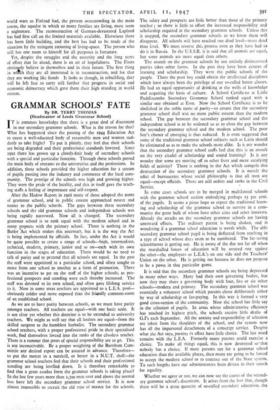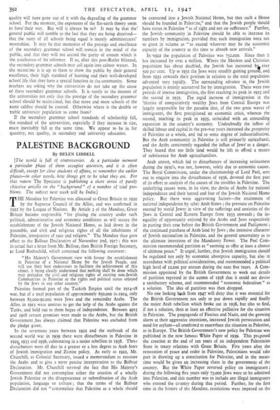GRAMMAR' SCHOOLS' FATE
By DR. TERRY THOMAS (Headmaster of Leeds Grammar School)
IT is common knowledge that there is a great deal of discontent -C in our secondary grammar schools. What is the reason for this? What has happened since the passing of the i944 Education Act to cause a well-educated body of reasonable men and women sud- denly to take fright? To put it plainly, they feel that their schools are being degraded and their professional standards lowered. Since 1902 there has grown up a closely-knit body of secondary schools with a special and particular function. Through these schools passed the main body of entrants to the universities and the professions. In addition, these schools provided the higher education for a stream of pupils passing into the industry and commerce of the local com- munity. The prestige of the schools was high and growing higher. They were the pride of the locality, and this in itself gave the teach- ing staffs a feeling of importance and self-respect.
After the Hadow Report in 1926 many of these adopted the name of grammar school, and in public esteem approached nearer and nearer to the public schools. The gaps between these secondary schools and the old grammar schools and independent schools was being rapidly narrowed. Now all is changed. The secondary grammar school is to rank equal with the modern school and in many respects with the primary school. There is nothing in the Butler 'Act which makes this necessary, but it is the way the Act is being implemented by officials. In fact, under the Act it would be quite possible to create a range of schools—high, intermediate, technical, modern, primary, junior and so on—each with its own function in the stages of education. There would be no need to talk of parity and to pretend that all schools are equal. In the past the staff were appointed to a particular school, and often sought to move from one school to another as a form of promotion. There was an incentive to get on the staff of the higher schools, as pro- fessional prospects and standing were each thereby increased. The staff was devoted to its own school, and often gave lifelong service to it. Now in some areas teachers are appointed to a L.E.A. pool— obviously colder and more exposed than the friendly common-room of an established school.
As we are to have parity between schools, so we must have parity amongst teachers. All teachers arc equal—with one basic scale. It is not clear yet whether this doctrine is to be extended to university teachers. We might as well say that all healers are equal—from the skilled surgeon to the humblest herbalist. The secondary grammar school teachers, with a proper professional pride in their specialised work, find themselves forced into the ranks of the classless teacher. There is a rumour that posts of special responsibility are to go. This is not inconceivable. By a proper weighting of the Burnham Com- mittee any desired report can be assured in advance. Therefore— to put the matter in a nutshell, or better in a N.U.T. shell—the grammar school teachers feel that their schools and their professional standing are being levelled down. Is it therefore remarkable to find that a great exodus from the grammar schools is taking place? In the last few years more than 1,300 men over and above the normal loss have left the secondary grammar school service. It is now almost impossible to recruit the old type of master for the schools. The salary and prospects are little better than those of the primary teacher ; so there is little to offset the increased responsibility and scholarship required in the secondary grammar schools. Unless this it stopped, the secondary grammar schools as we know them will disappear. All schools will have reached one dead level—more dead than level. We must reverse this process even as they have had to do it in Russia. In the U.S.S.R. it is said that all animals are equal, but some animals are more equal than others.
The assault on the grammar schools by not entirely disinterested parties takes other forms. In the past they have been centres of learning and scholarship. They were the public schools of the people. There the poor boy could obtain the intellectual disciplines which have always been the privilege of our so-called better classes. He had an equal opportunity of drinking at the wells of knowledge and acquiring the basis of culture. A School Certificate at Little Puddlecombe Secondary Grammar School ranked equal with a similar one obtained at Eton. Now the School Certificate is to be abolished in the noble name of parity—to ensure that the secondary grammar school shall win no more public esteem than the modern school. The gap between the secondary granimar school and the independent school is to be widened so as to close the gap between the secondary grammar school and the modern school. The poor boy's chance of emerging is thus reduced. It is even suggested that some of the traditional grammar school subjects such as Latin should be eliminated so as to make the schools more alike. Is it any wonder that the secondary grammar school staffs feel that this is an assault on the very citadel of scholarship and sound learning? Is it any wonder that some are moving off to other freer and more satisfying fields of activity? There is nothing in the Act which compels this destruction of the secondary grammar schools. It is merely the edict of bureaucrats whose social philosophy is that all men are equal—except officials. There are still orders and ranks in the Civil
Service. • In some cases schools are to be merged in multilateral schools with the grammar school section embodying perhaps 15 per cent. of the pupils. It seems a pious hope to expect the traditional learn- ing and scholarship of the grammar school to survive in a com- munity the great bulk of whom have other aims and other interests. Already the attacks on the secondary grammar schools are having untoward effects. The ordinary parent is being shaken, and is wondering if a grammar school education is worth while. The able secondary grammar school pupil is being deflected from teaching in a type of school whose days seem to be numbered. The far-seeing schoolmaster is getting out. He is aware of the day not far off when the marshalled forces of education will be arrayed one against the other—the employers or L.E.A.'s on one side and the Teachers' Union on the other. He is getting out because he does not propose to be a pawn in that particular game.
It is said that the secondary grammar schools are being depressed in many other ways. Many had their own governing bodies, but now they may share a governing body with four, five or six other schools—modern and primary. The secondary grammar school was essentially a volunteer school which parents chose deliberately either by way of scholarship or fee-paying. In this way it formed a very good cross-section of the community. Now the school has little say in the selection of pupils. In areas where administrative efficiency has reached its highest pitch, the schools receive little drafts of G.I's each September. All the anxiety and responsibility of selection are taken from the shoulders of the school, and the system now has all the impersonal detachment of a conscript service. Despite what the Act says, parents in effect have little choice. The last word remains with the L.E.A. Formerly many parents could exercise a choice. To make all things equal, this is now destroyed so chat nobody has a choice. If more parents opt for a grammar school education than the available places, then many are going to be forced to accept the modern school or to contract out of the State system. To such lengths have our administrators been driven in their search for equality.
Whether we agree or not, we can now see the causes of the second- ary grammar school's discontent. It arises from the fear that, though there will be a great quantity of so-called secondary education, the quality will have gone out of it with the degrading of the grammar school. For the moment, the exponents of the flat-earth theory seem to have' their way. But will it always be so? It may be that the' general public will tumble to the fact that they are being deceived— that the story of all schools being equal is merely administrators' moonshine. It may be that memories of the prestige and excellence of the secondary grammar school will remain in the mind of the public, and that they will not accord the parity of esteem which is the touchstone of the reformer. If so, after this post-Butler blizzard, the secondary grammar schools may sail again into calmer waters. In the meantime it is up to them to show the public by their general excellence, their high standard of learning and their well-developed school life that they have a special function in the community. Some teachers are asking why the universities do not take up the cause of these secondary grammar schools. It is surely to the interest of the universities not only that the prestige of the secondary grammar school should be maintained, but that more and more schools of the same calibre should be created. Otherwise where is the double or treble university population to come from?
If the secondary grammar school standards of scholarship fall, the standard of the universities, especially if they increase in size, must inevitably fall at the same time. We appear to be in for quantity, not quality, in secondary and university education.



































 Previous page
Previous page